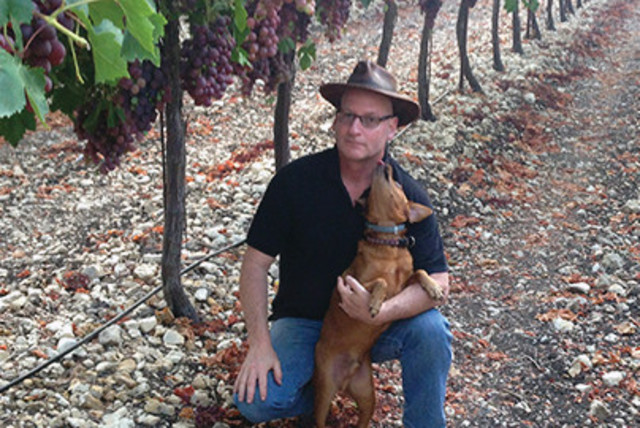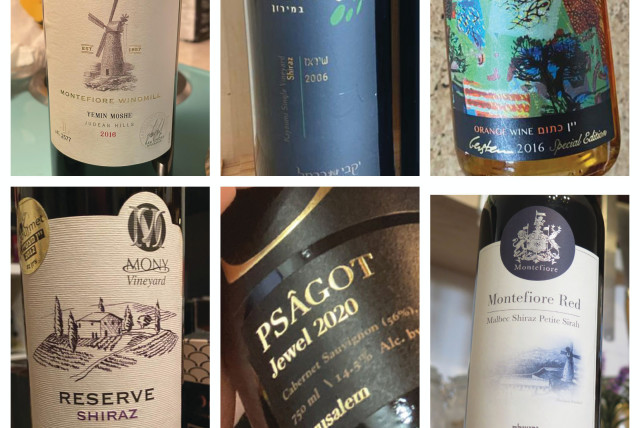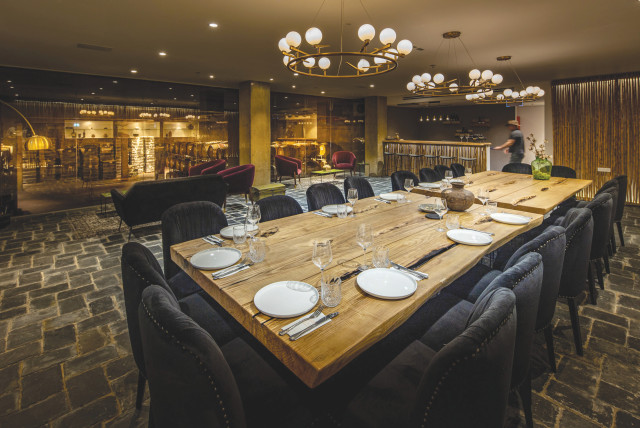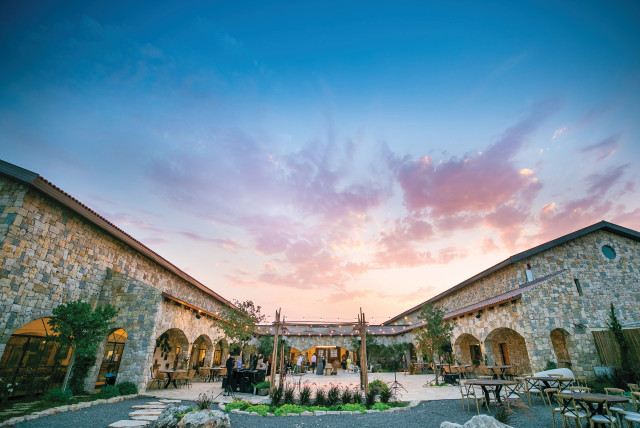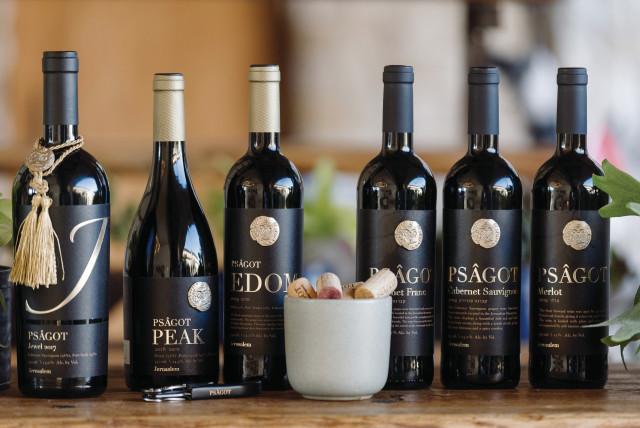Meet the Canadian-born Israeli working as a top winemaker
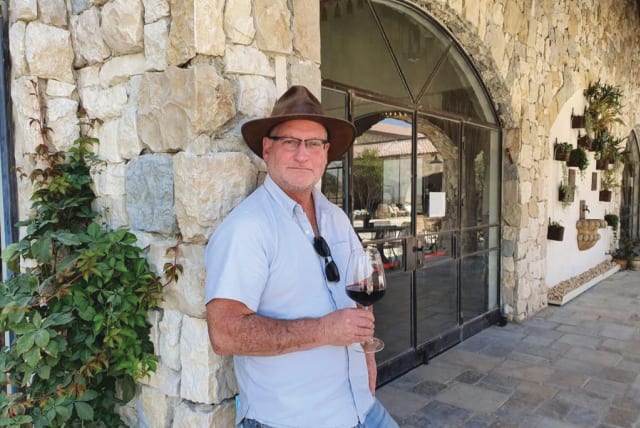
Sam Soroka is an artist, with a childlike joy in the things he appreciates, but he also is a sensitive soul who can be insecure. And he is making wine better.
I first met Sam Soroka in 2003 at a restaurant in Bordeaux, France. We were there for the large Vinexpo wine exhibition.
David Ziv – then the creative, innovative CEO of Carmel Winery ־ was determined to shake away the cobwebs of the old Carmel Mizrahi. He opened a boutique winery within Zichron Ya’acov Wine Cellars, also Yatir Winery at Tel Arad in the South, and Kayoumi Winery, a grape receiving station at Ramat Dalton in the North. He appointed Peter Stern, the legendary wine consultant of the Golan Heights Winery for 20 years, to advise Carmel, and strove to infuse the winemaking at Rishon Le Zion and Zichron Ya’acov Cellars with new talent.
Soroka, today 60, was born in Canada. He studied food science at McGill University in Montreal, oenology at the University of Adelaide in Australia, and had experience working as a winemaker in Australia, Canada, California, and France. Peter Stern persuaded him to come to Israel, and he was quite a catch. That lunch was his first meeting with Ziv.
A few months later Soroka was here, working in the 2003 harvest as winemaker of the Zichron Boutique, designed with the best equipment to drastically upgrade Carmel’s wines. He teamed up with Lior Lacser, initially chief winemaker of Rishon Le Zion Cellars, and later to be appointed chief winemaker of what had become known as Carmel Winery.
The wine work of Sam Soroka
Soroka is an artist, with a childlike joy in the things he appreciates, but he also is a sensitive soul who can be insecure. He is quiet and loves music and photography. He studied anthropology and photography at Concordia University in Montreal. He sees making wine in different countries as kind of practical anthropology.
He loves animals, and they are drawn to him. There is not a stray cat wandering in the winery he will not adopt, or a rejected dog from a Bedouin village that he will not give a home to. His home is a menagerie. To paraphrase Gandhi “the greatness of a person... may be judged by the way he/she treats animals.” Using that parameter, Soroka passes with a very high score.
Despite his having traveled widely, Israel was still quite a culture shock for him. I was also working at Carmel, having moved from the Golan Heights Winery, encouraged by the Ziv revolution. During the crazy harvest season, winemakers work long hours under enormous pressure. I occasionally received telephone calls from a distraught Soroka. Sometimes he despaired about Israeli manners, attitude, and work ethic, but he adapted and, despite many downs, seemed to cope pretty well.
However, he did help to create a wine revolution. The 2003 Carmel Kayoumi Vineyard Cabernet Sauvignons and Shiraz won the top prizes at Israel’s main wine tasting competition, and they did so again the following year. Then, in 2006, Carmel Limited Edition 2003 was launched. Howard Goldberg of The New York Times remarked to me that it was the best Israeli wine he had tasted. It was so elegant, unusual in a prestige Israeli wine. Soroka and Lacser jointly signed the back label of these wines. They never received the credit they deserved because it was Carmel, but these were great wines by any measure.
The Carmel Kayoumi Shiraz 2006 was conceived during the Second Lebanon War. At times, like now, winemakers were forbidden to enter the Upper Galilee vineyards. However, this wine won the Regional and International Trophy at the Decanter World Wine Awards in 2010.
Israeli wines have won many important awards, but none have gone this far. It remains the finest prize ever won by an Israeli wine. It was Soroka’s wine, and of course Lacser’s as chief winemaker. They both signed the back label. I was privileged to be on hand to receive the trophy with Lacser at the Gala Dinner Presentation in London.
Then Soroka was moved from the Zichron Boutique to Rishon Le Zion Cellars, the largest winery in the country at the time. Success has many fathers. Many people were involved in the turnaround, but this does not mean that Soroka should not be given the credit he deserves. There is no doubt in my mind that he and Lacser made the best wines at Carmel over the previous 120 years.
AFTER FIVE years and nine months with Carmel, Soroka moved to Mony Winery, which did not have a great reputation for wine, though its olive oil was first class. This is a winery owned by an Israeli Arab family, situated in the shadow of Deir Rafat Monastery, overlooking the Sorek Valley vineyards and olive groves, and it makes kosher wine.
Soroka always took on big challenges, and, being sensitive, he always suffered if he thought anything was standing in the way of his search for perfection. Here the big challenge was the smoking, which used to drive Soroka crazy. Again, by raising the bar high and insisting on a better work ethic, he was able to induce a turnaround.
His Mony Reserve Shiraz and Chardonnay won awards, a first for the winery, but most memorable was probably the Colombard, which was inexpensive and wonderful value. It was the first winery to show the benefit of this simple variety in our hot climate, and it was the beginning of the renaissance of the variety Israelis once called French Colombard.
When Kerem Montefiore was opened as an innovative start-up winery, the owner thought that Soroka should be the winemaker. I thought this was exactly the right decision. Their best wine was the entry-level Montefiore Red, an unoaked blend of Malbec, Petite Sirah, and Shiraz, which received a great deal of credit – internationally, too – for its value and drinkability. It was a shooting star winery that did not last long, but its reputation was very good during the period Soroka was involved.
After five years at Mony, his next stop was the Jerusalem Vineyard Winery at Atarot. This was a winery primarily known for liquid religion (grape juice and Kiddush wine), and a quality revolution was overdue. Soroka again went into the lion’s den with his usual naive optimism, but again in five years there was a turnaround. He had a great deal of support from the impressive and dynamic CEO, Erez Winner.
The most memorable wine Soroka made there was his Orange Wine made from Emerald Riesling, a white wine made on its skins like a red wine. It was a big hit, and again it was a pioneering wine.
He also made a one-off range of wines under the label Montefiore Windmill. This was to commemorate the fact that the winery had opened a visitors’ center at the Montefiore Windmill in the Mishkenot Sha’ananim-Yemin Moshe neighborhood. The prestige wine was called Yemin Moshe, and it was a blend of Cabernet Sauvignon, Merlot, and Petit Verdot. It really was a beautiful wine, but rare. The winery later replaced it with a series of wines called The Windmill Project.
Those old-time colleagues and partners, Soroka and Lacser, met again. Soroka kindly helped out Lacser with the bottling of Carmel’s grape juice one year. This was Lacser’s introduction to the Jerusalem Vineyard Winery. After he left Carmel, Lacser started to work as a consultant to the Jerusalem Winery, and hey presto, within a short time, he was able to put himself into the position to replace not only Soroka as winemaker but also Winner as CEO! Since then, Lacser has continued the improvements started by Soroka. So, after five years (do you notice the pattern here?), Soroka found himself moving again.
OVER THE years, Soroka moved eastward with each job. He started in the Coastal Plain, moved to the Judean Foothills, the Judean Hills, and ended up in the Central Mountains. He joined Psagot Winery. Founded in 2003 by Yaakov and Na’ama Berg, the winery moved to a new home in the Sha’ar Binyamin area, 15 minutes from Jerusalem, in 2020.
Yaakov is dynamic, always on the move, and a pusher. He is a mover and shaker. As a result, Psagot is fast-growing, and business-wise it is a wonderful success. Not only is it the biggest winery in the Central Mountains, but it takes the lead in advancing and promoting the rights of the wineries of the region politically. Na’ama is the soul of the winery. She is incredibly hardworking, has great style, and she is responsible for the touch-and-feel side of the winery.
It must be one of the most beautiful wineries in the country. The beautiful stone building houses the winery, with a large barrel room that may viewed from above. The visitors’ center is welcoming, and it offers tours, tastings, films, and explanations. The food menu is good, specializing in homemade pastries. The artful nooks and crannies and tasteful bric-a-brac are all Na’ama’s work. She certainly has great taste. Most impressive is the potential for holding events of different sizes. The main hospitality room leads out into a lovely garden overlooking the sparse, rugged, stony, biblical-looking Wadi Kelt and Edom Mountains.
Of the wines I tasted, I liked the aromatic Psagot Sauvignon Blanc 2022; a mouth-coating Viognier 2022; the full-flavored Homeland 2021; and the complex SV (single Vineyard) 2020. The entry-level Sinai is also a good buy. Best is the Psagot Peak, a southern Rhone-style blend of Petite Sirah and Shiraz; it is deep, rich, and complex. No doubt a high-quality wine, and an impressive points scorer in international competition. Soroka is also particularly proud of the flagship wine Psagot Jewel 2021, which he has fine-tuned to his taste.
Soroka did not take the easy route. Each winery he joined had its own special challenges, to say the least, but the proof of the pudding is in the eating. Every winery Soroka touched experienced a turnaround in quality and image. At Psagot it is still a work in progress, but I think he is already effecting change. The magic is working.
So Soroka and Psagot is a good marriage. I have always had the impression that this winery is more interested in sales than quality. It likes to be seen as stylish but doesn’t make much effort in public relations to the wine world. For years, it even made do without an internationally trained winemaker. Then Ya’acov Oryah was appointed, but part time. Now the appointment of Soroka brings that professional element the winery was sorely missing in the past.
As for Soroka, he is as happy as a boy in a sandbox. For him, going to work for Psagot Winery was an excellent move. He says he is ultimately grateful to Lior Lacser: “He really did me a favor!”
The writer is a winery insider turned wine writer, who has advanced Israeli wine for 35 years. He is referred to as the English voice of Israeli wine. www.adammontefiore.com
Jerusalem Post Store
`; document.getElementById("linkPremium").innerHTML = cont; var divWithLink = document.getElementById("premium-link"); if (divWithLink !== null && divWithLink !== 'undefined') { divWithLink.style.border = "solid 1px #cb0f3e"; divWithLink.style.textAlign = "center"; divWithLink.style.marginBottom = "15px"; divWithLink.style.marginTop = "15px"; divWithLink.style.width = "100%"; divWithLink.style.backgroundColor = "#122952"; divWithLink.style.color = "#ffffff"; divWithLink.style.lineHeight = "1.5"; } } (function (v, i) { });

